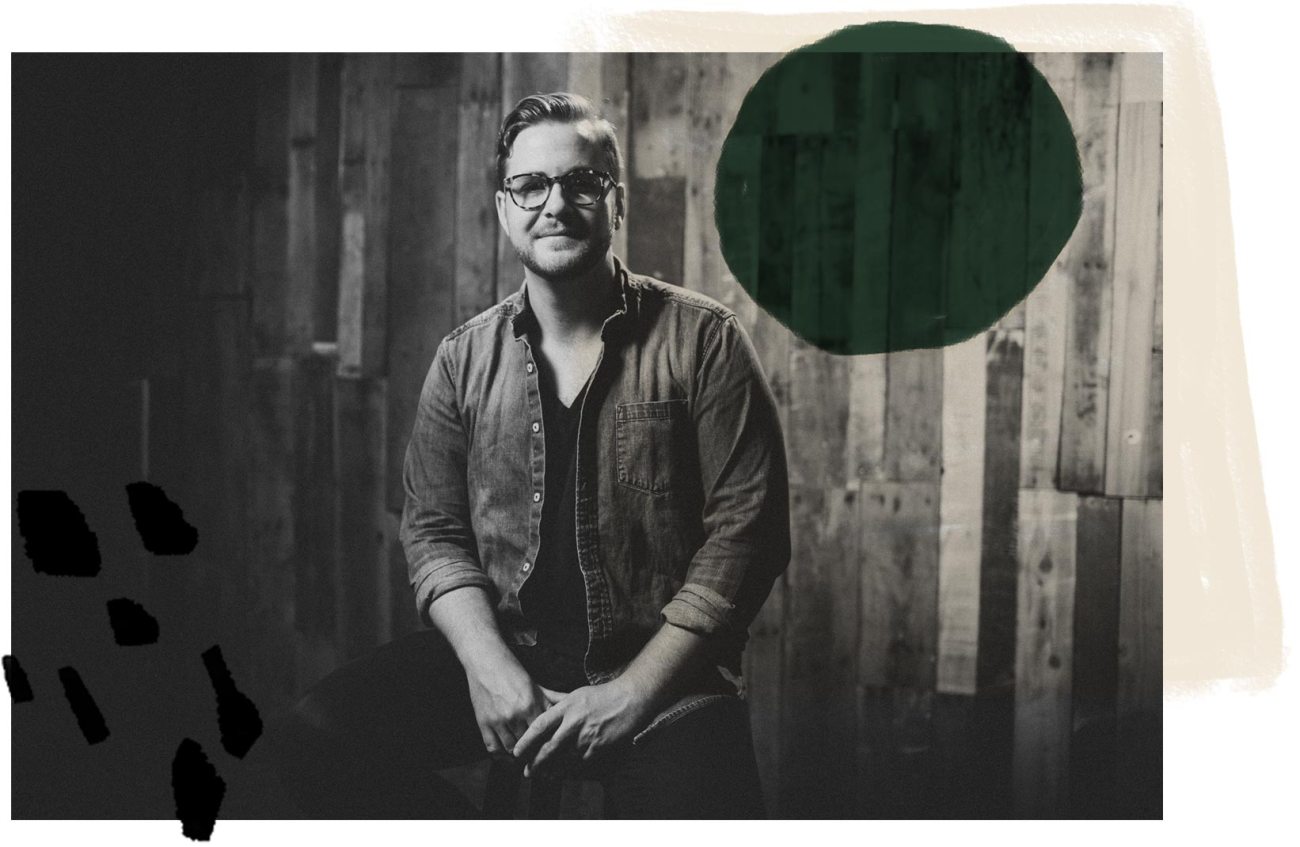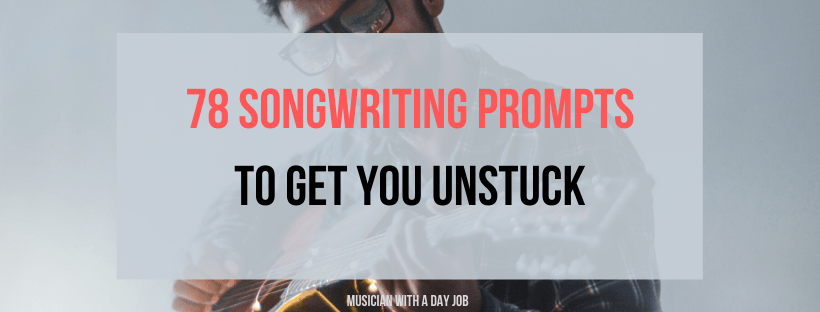
I did a Q&A via email with Grammy-winning songwriter Jordan Reynolds.
He’s written songs that have been recorded by Keith Urban, Lady A, Thomas Rhett, Camilla Cabello, Brett Eldredge, Carrie Underwood, Dan + Shay, and others.
Check it out below…
Table of Contents
Free Download: 78 Songwriting Prompts To Get You Unstuck

What’s your favorite approach to songwriting?
My favorite approach to songwriting is finding a concept that everyone in the room is inspired by, and going from there. My thought is that if someone’s not inspired by a concept, they’re not going to be the best songwriter they can be. I think as far as the health of a song, or the reach of a song, it all depends on how great the concept is. You can create a song with great melodies and a great feel, but if you don’t have great lyrics or a great concept with it, it can only go so far.
And sure, there are songs that we love because they just feel good to listen to, but I think the biggest songs that you see — those classic songs that kind of live on — are the ones that marry all of the things: the production, the concept, the melody. Starting from the concept inspires everything else.
RELATED: 10 Sneaky Songwriting Tips That Actually Work
How can someone start writing a song if they’ve never tried before?
This really depends on someone’s skill set. For example, when I first started writing songs, my strength was the music. I would start with chords and melodies if I just had nothing, especially when I wasn’t writing songs at all. I knew music, so I could create music.
Now if your strength is in lyrics or poetry, try just writing out lyrics and making them make sense. Again, with the concept being the most important thing, see if you can write some lyrics to a consistent hook, or the last line of a chorus. Starting with what you know is probably the easiest way.
I’m also a huge fan of collaborating. What it does is let you bring in somebody who has the strengths that you may not have. For me early on, I brought in lyricists because I wanted to learn and glean from them. And then as you continue to write, you get better and work those muscles on the things that you’re not as good at. So if you’re a great lyricist, you can work on your music muscle — start learning chords and melodies and why certain ones work.
RELATED: 11 Songwriting Prompts To Get You Unstuck
What are some songwriting tools you use regularly?
One is WikiRhymer.com — I love having a good rhyming resource. I will say that if I need a rhyme, I don’t go there immediately. I try to let my brain explore for a little bit and if I still can’t think of anything, then I’ll bring in WikiRhymer. Sometimes seeing a word or a little phrase that rhymes with something can help me open up some thoughts and bring some inspiration. But I try to help my brain do that first.
The other tool that I use regularly is Logic. I use it for piano sounds or to create a small little loop that might inspire melodies or a mood. It’s a pretty common tool that people in all cities of music are using and is what I use every day.
RELATED: Evernote Review: the Songwriting App To Help You Write Songs Faster
What’s your advice for a new songwriter who doesn’t have much time to write?
Pretty much every songwriter I know didn’t just get to be a songwriter full-time and not have another job. I worked another job for five years into a publishing deal, so everybody’s going to have to face that at some point.
Try to make writing a priority, which is difficult. But carve out space in your schedule around your other work schedule and stick to it. Find co-writers that you like working with who help bring some kind of accountability to you showing up and writing a song. Sticking to a schedule could also mean looking at your week ahead of time and saying ‘Okay, I’m working during these hours’ or ‘I’m going to give myself an hour.’ And don’t be ashamed if that’s all the time you have! An hour here and there will add up to way more growth as a writer than you could normally expect. Work every day at it, even if every day means ‘I just wrote down some ideas.’ Time will make a massive difference.
RELATED: 9 Songwriting Tools To Help Maximize Your Time and Creativity
Anything else you’d like to add?
Something that has helped me at times that I think is important for writers — especially for new writers — is looking at the credits of songs that you love. You may be surprised at who you find — it happens to me all the time.
Once you’ve looked at the credits, find some of these writers. Look up their stories, look up how they got into writing, look up their influences, and then start studying the way that they write songs. See if you can find patterns in the way that they write. I just think there’s so much to be learned from studying music — like listening to songs and rhyme schemes, or listening to how certain people put together certain phrases. There’s even a lot to learn from how people copy certain melodies and choruses, how they can be simplified in contrast to how the verses are more rapid-fire.
Studying songwriters and studying how people write songs is one of the best things you can do. Just listen to a lot of music and become familiar with the genre you want to work inside of.
Free Download: 78 Songwriting Prompts
On top of being a Grammy Award Winner, Jordan Reynolds teaches songwriters the proven methods to writing better songs through his website, Better Songs.
Further reading
- Casino Not On Gamstop
- Non Gamstop Betting Sites
- Non Gamstop Casinos UK
- Casino Retrait Immédiat
- Casino Sites Not On Gamstop
- Gambling Sites Not On Gamstop
- Non Gamstop Casinos UK
- Non Gamstop Casino Sites UK
- Slots Not On Gamstop
- Non Gamstop Casino UK
- Meilleur Casino En Ligne
- Beste Online Casino Nederland
- Non Gamstop Casino UK
- Casino Sites Not On Gamstop
- Non Gamstop Casinos
- UK Casinos Not On Gamstop
- Sports Betting Sites UK
- Slot Sites Uk
- Gokken Zonder Cruks
- Non Gamstop Casinos
- Non Gamstop Casinos UK
- UK Casino Sites Not On Gamstop
- UK Online Casinos Not On Gamstop
- Migliori Casino Non Aams
- Migliori App Casino Online
- Migliori Casino Non Aams
- Top 10 Casino En Ligne Belgique
- I Migliori Casino Non Aams
- Meilleur Site Pour Jouer Au Poker
- Paris Sportifs Crypto
- KYC 인증 없는 카지노
- Casino Live En Ligne Français
- 온라인홀덤
- Top Casino En Ligne
- Casino En Ligne
- Casino Italia Non Aams
- Casino En Ligne Français
- Migliori Siti Casino Non Aams 2026
- 카지노코인